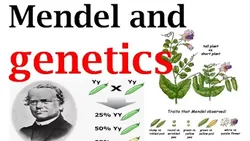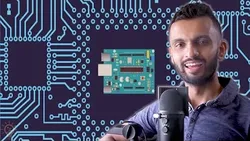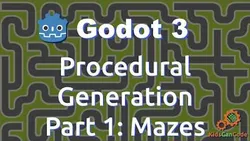
Genes and Sunlight — Steve Jones / Serious Science 
This course covers topics related to genetics, such as genes and sunlight, genome annotation, genes and the environment, genome medicine, and educational achievement. Steve Jones and Tim Hubbard from Serious Science provide insight into these topics, helping to further our understanding of genetics. ▼
ADVERTISEMENT
Course Feature
![]() Cost:
Cost:
Free
![]() Provider:
Provider:
Youtube
![]() Certificate:
Certificate:
Paid Certification
![]() Language:
Language:
English
![]() Start Date:
Start Date:
On-Demand
Course Overview
❗The content presented here is sourced directly from Youtube platform. For comprehensive course details, including enrollment information, simply click on the 'Go to class' link on our website.
Updated in [February 21st, 2023]
Genes and Sunlight — Steve Jones / Serious Science.
Genome Annotation — Tim Hubbard / Serious Science.
Genes and the Environment — Steve Jones / Serious Science.
Genome Medicine — Tim Hubbard / Serious Science.
Educational Achievement and Intelligence Robert Plomin.
Genetics and Education Michael Thomas.
Genetics and Intelligence Robert Plomin.
Genetics and Education Michael Thomas.
Genetics and Intelligence Robert Plomin.
Behavioral Genetics Robert Plomin.
DNA and Behavioral Genetics - Robert Plomin.
Genetics of Obesity and Diabetes - Nick Wareham.
Steve Jones — Genetics of the Nature.
Genetics of Wild Mice Behavior - Hopi Hoekstra.
Mitochondrial Genetics of Aging - Konstantin Khrapko.
Genetics of Color Adaptation - Hopi Hoekstra.
Cancer-causing Genes — Justin Stebbing / Serious Science.
Genes and the Environment — Steve Jones / Serious Science.
Genes and Sunlight — Steve Jones / Serious Science.
Twin Studies — Tim Spector.
Paleogenetics - Steven Benner.
Genetic Diversity in Humans — Steve Jones / Serious Science.
(Please note that we obtained the following content based on information that users may want to know, such as skills, applicable scenarios, future development, etc., combined with AI tools, and have been manually reviewed)
This course provides an overview of the field of genetics, from the basics of DNA and gene expression to the more complex topics of genetic engineering, epigenetics, and the effects of environment on gene expression. It covers topics such as genome annotation, genome medicine, educational achievement and intelligence, genetics and education, genetics and intelligence, behavioral genetics, DNA and behavioral genetics, genetics of obesity and diabetes, genetics of the nature, genetics of wild mice behavior, mitochondrial genetics of aging, genetics of color adaptation, cancer-causing genes, twin studies, paleogenetics, and genetic diversity in humans.
Possible Development Paths include pursuing a degree in genetics, molecular biology, or biochemistry, or a related field such as bioinformatics or biotechnology. Learners could also pursue a career in research, clinical genetics, or genetic counseling.
Learning Suggestions for learners include reading books and articles on genetics, attending lectures and seminars on the subject, and participating in research projects. Learners should also consider taking courses in related fields such as biochemistry, molecular biology, bioinformatics, and biotechnology. Additionally, learners should consider joining professional organizations such as the American Society of Human Genetics and the International Society of Genetic Genealogy.
[Applications]
Those who have completed the Genes and Sunlight — Steve Jones / Serious Science course can apply their knowledge to a variety of topics. They can use their understanding of genetics to explore the effects of the environment on gene expression, the role of genes in educational achievement and intelligence, the genetics of obesity and diabetes, the genetics of wild mice behavior, the genetics of color adaptation, cancer-causing genes, twin studies, paleogenetics, and genetic diversity in humans. Additionally, they can use their knowledge to explore the effects of sunlight on gene expression.
[Career Paths]
1. Genetic Counselor: Genetic counselors are healthcare professionals who provide information and support to individuals and families who have, or may be at risk for, genetic conditions. They help patients understand their genetic risks and make informed decisions about their health care. Genetic counselors are also involved in research and education, helping to develop new treatments and therapies. As the field of genetics continues to expand, the demand for genetic counselors is expected to grow.
2. Genetic Epidemiologist: Genetic epidemiologists study the genetic and environmental factors that influence the development of diseases. They use a variety of methods, such as family studies, twin studies, and population studies, to identify genetic and environmental risk factors for diseases. As the field of genetics continues to expand, the demand for genetic epidemiologists is expected to grow.
3. Bioinformatician: Bioinformaticians use computer science and mathematics to analyze and interpret biological data. They develop algorithms and software to analyze large datasets, such as genomic data, and use this information to identify patterns and trends. As the field of genetics continues to expand, the demand for bioinformaticians is expected to grow.
4. Genetic Technologist: Genetic technologists use laboratory techniques to analyze and interpret genetic data. They use a variety of methods, such as DNA sequencing, PCR, and gene expression analysis, to identify genetic mutations and other genetic variations. As the field of genetics continues to expand, the demand for genetic technologists is expected to grow.
Course Provider

Provider Youtube's Stats at AZClass
Discussion and Reviews
0.0 (Based on 0 reviews)
Explore Similar Online Courses

Fun and Easy Microcontroller Communication Protocols

Procedural Generation in Godot

Python for Informatics: Exploring Information

Social Network Analysis

Introduction to Systematic Review and Meta-Analysis

The Analytics Edge

DCO042 - Python For Informatics

Causal Diagrams: Draw Your Assumptions Before Your Conclusions

Whole genome sequencing of bacterial genomes - tools and applications

Biology 102: Basic Genetics

Introduction to Genetics: Certificate Program


Start your review of Genes and Sunlight — Steve Jones / Serious Science